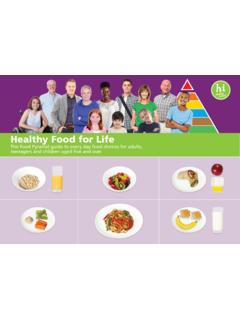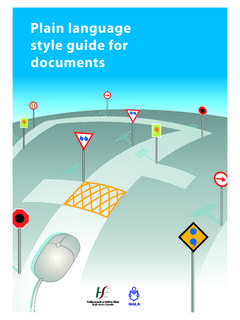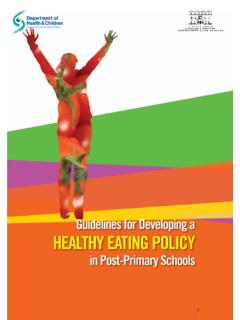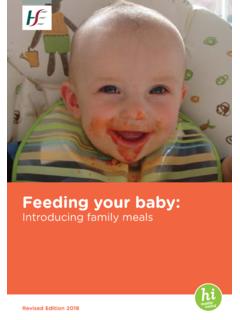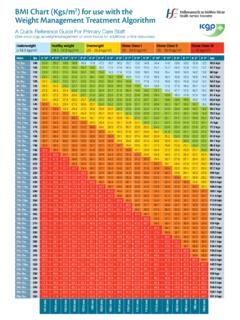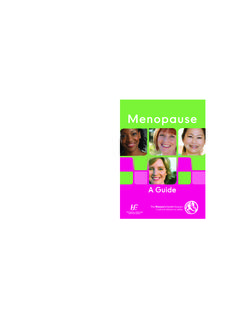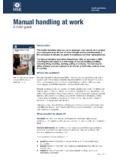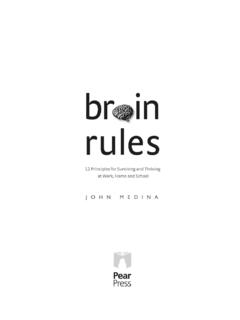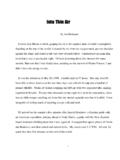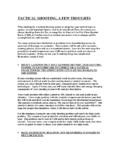Transcription of A guide to your pregnancy month by month - …
1 month by monthA guide to your pregnancyCongratulations, you re pregnantYou can use this calendar to keep a record of important dates and events during your pregnancy you may like to keep it as a memento of your pregnancy to be shared with your baby when they grow up. The calendar also contains useful information to help you have a healthy is a good time to think about what will happen when your baby is born. How you choose to feed your baby is a very important decision which can affect your child s health for years to come.
2 If your baby could choose, they would want to be World Health Organisation and the Department of Health and Children recommend that mothers breastfeed their babies, with no other food or drinks, for the first six months. After that, you can combine breastfeeding with healthy foods for your baby. During the first month , your baby s head, brain , spinal cord, lungs and heart begin to your GP. Take folic acid (400 micrograms) every your copy of Healthy Eating for pregnancy from your local health promotion department.
3 1st MonthWhen is my baby due? your doctor or midwife will work out your due date by adding 9 months and 7 days to the first day of your last period. This is called your expected date of delivery (EDD).They can also work this out from your ultrasound scan or examination. Remember this is only an estimate most women have their babies slightly before or after this sicknessYou may suffer from morning sickness (nausea and vomiting) due to hormonal changes in the early months. Despite its name, this can happen at any time of the day or night.
4 If you do suffer from morning sickness, try to: avoid cooking smells get as much fresh air as possible drink plenty of water eat small meals frequently (every 2-3 hours), rather than two or three larger ones avoid fatty or spicy foods eat a dry cracker, plain biscuit or a slice of toast in the morning before you get out of bed Ask your midwife or dietitian for advice. If symptoms are severe, contact your GP. Morning sickness usually improves after 16 for two?You should eat a balanced healthy diet, for your own health as well as your baby s growth and development.
5 You don t need to eat for two , but it is important to eat enough of the right foods. Use the Healthy Eating for pregnancy booklet to plan a healthy to think aboutCut out alcohol altogether while you re pregnant this is the best way to reduce any risk of damage to your baby from you or your partner smoke, do your best to stop now. Cigarette smoke releases dangerous chemicals into your blood which pass on to your baby. These can reduce your baby s growth and increase the risk of complications. If you need help to stop, talk to your doctor, call the Quitline on 1850 201 203 or visit t take any drugs not even paracetamol without asking your the second month , your baby s organs, muscles, bones, arms and legs begin to grow.
6 your baby s face is also to your GP about antenatal care (care before the baby is born). You are entitled to free GP care and public hospital care for your pregnancy and for 6 weeks after your baby is born. Take regular gentle exercise such as walking or swimming. If you play sport, check with your GP if it is ok to keep it MonthWhy do I have to go to my doctor or midwife so often?Regular antenatal care is important so that you and your baby stay healthy throughout pregnancy . You can choose to have your check-ups with midwives only, with your GP sharing your care with the maternity hospital or midwife (combined care scheme), or just with the doctors and midwives in the hospital.
7 Ask your GP s advice to help you decide where you would like your baby to be changes you may notice You may feel the need to use the bathroom more often to pass urine. You may get constipated. Eat extra fruit and drink plenty of water to avoid this. You may feel extremely tired. Try to get as much rest as you can. You may get morning sickness (nausea and vomiting) in the morning or during the day. your may have mixed feelings. However much you may want this baby, it is only natural to worry about how things will turn out.
8 It helps to talk through your feelings with your partner, a friend or your to do Always wash your hands before and after preparing food, using the toilet, gardening or handling animals. Get plenty of rest. If you feel tired, try to make time to put your feet up. Make sure all the foods you eat are fresh, clean, hygienically prepared and stored the third month , your baby s heart grows more. Eyelids, fingers, toes and skin grow, and the baby begins moving (although you won t feel it yet).
9 MondayTuesdayWednesdayThursdayFridaySatu rdaySundayBook your antenatal classes. Classes will help you feel prepared and confident about labour and the birth of your baby. Let your employer know you are pregnant. Discuss any possible work-related dangers with your doctor or midwife. Find out about maternity leave and MonthWhy is breastfeeding good for my baby?Breastmilk is the perfect first food, especially if your baby arrives early. Breastfeeding helps you continue the close relationship you have had with your baby during pregnancy .
10 It is natural for babies to be breastfed it helps them feel safe and happy. Breastmilk protects against colds, gastroenteritis, chest and ear infections and allergies. Some changes you may noticeYou may feel faint or actually faint, especially during early pregnancy . your blood pressure tends to be lower than usual, so standing up quickly can cause you to feel faint. The demands made on your body by the growing baby may also cause your blood sugar levels to drop. If you feel faint: sit or lie down for a short time stand up slowly eat regularly - do not skip meals Something to think aboutBreastmilk is a perfect food for babies, made to provide them with their exact nutritional needs at every stage of growth.
